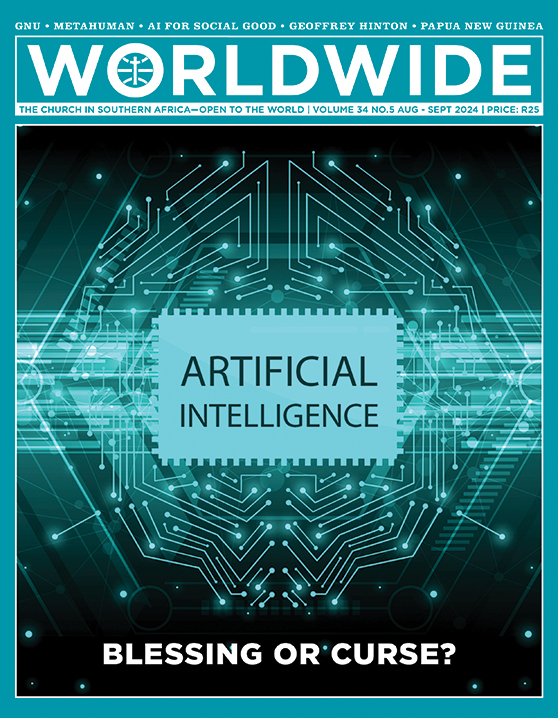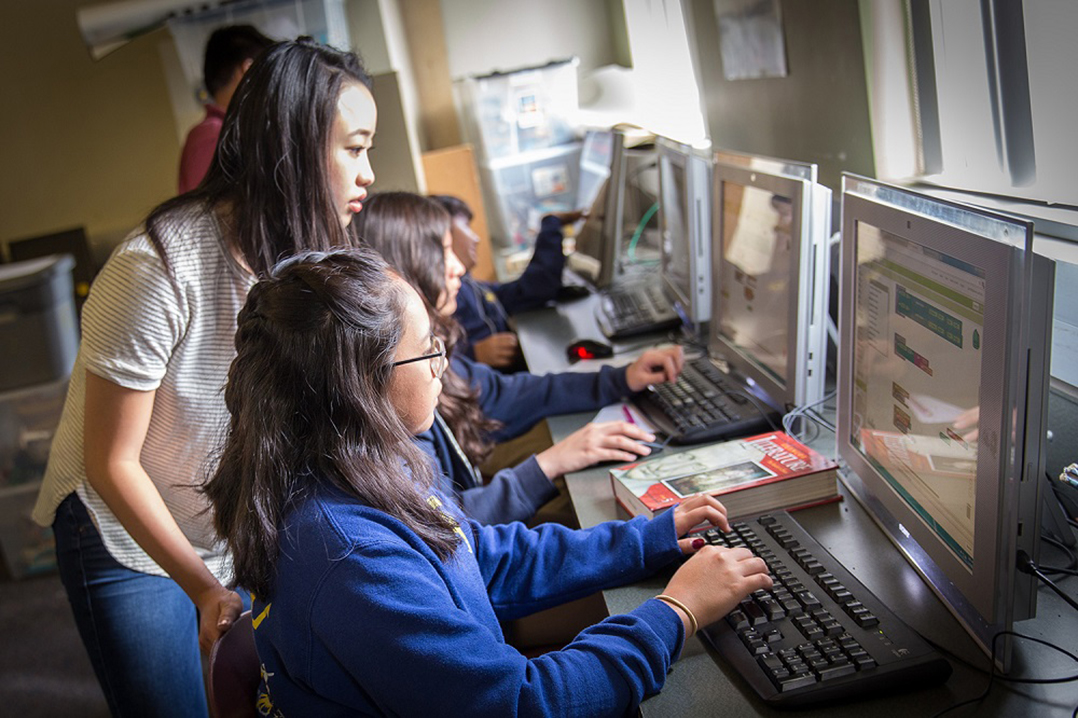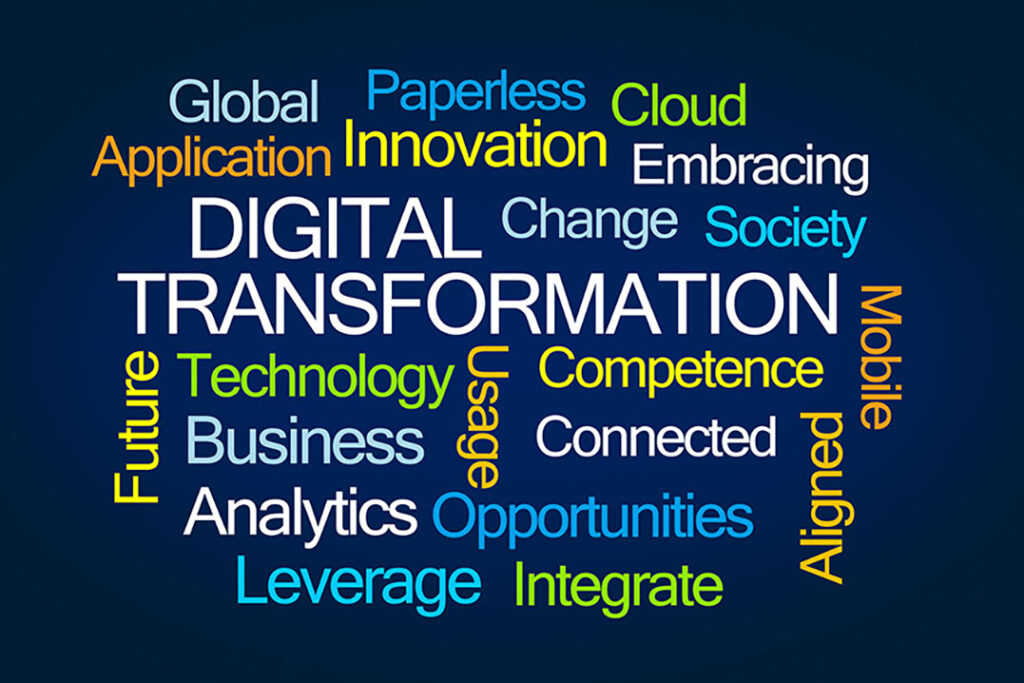
ARTIFICIAL INTELLIGENCE: BLESSING OR CURSE?
The image, according to Chat GPT, features the phrase “ARTIFICIAL INTELLIGENCE” at its centre, overlaid on a stylized depiction of a microchip and circuitry. This design symbolizes the integration of advanced AI technologies within modern electronic systems, emphasizing the critical role of AI in driving technological innovation and enhancing computational capabilities across various industries.
SPECIAL REPORT • ACADEMIA

INSTRUMENT FOR SOCIAL GOOD
We live in a world where technology is advancing at a dizzying pace. Artificial Intelligence (AI) has become an instrument of change capable of driving a significant transformation in multiple aspects of society. From a humanistic point of view, especially from the academic sphere, AI not only represents technological progress, but also a unique opportunity to promote social good.
BY EMILIANO BLASCO DOÑAMAYOR | VICE-RECTOR FOR STRATEGIC PLANNING AND DIGITAL CULTURE AT CEU SAN PABLO UNIVERSITY, MADRID, SPAIN
UNIVERSITIES, as centres of knowledge and ethics, have a key role to play in shaping technology so that its applications contribute to integral human development.
This has been a year of consolidation and progress in all areas of digital transformation (DT) which, in order to be successful, must be assimilated, shared and reflected upon when projects are executed by any organisation. First of all, it is important to stress that digitalisation is not the same as DT. Most institutions now understand what DT represents.
New AI digital era
We have undergone a transformation. A new digital culture must now take root in society. The changes experienced since the digital “explosion” three years ago—automation processes, remote or hybrid work, improved cybersecurity—have already made inroads. However, the most current important revolution is Generative Artificial Intelligence (GAI).
According to the European Commission (EC), an AI system is “a machine-based system designed to operate within different levels of autonomy and which can generate results such as predictions, recommendations or decisions, influencing physical and virtual environments.” AI is a technology which seeks to reproduce human capabilities in solving increasingly complex random problems.
It is therefore especially relevant to heed the impact of GAI tools, such as ChatGPT, and other models which appear daily. These are specialised in generating new and unique content from existing data and using advanced algorithms and neural networks, learning from texts and images. There is enormous potential in the use of GAI tools as digital assistants, both for educational and professional applications. As the number of AI technologies embedded in software packages increases, it is necessary to raise awareness among digital users about critical thinking, ensuring that these tools are used effectively and ethically, without impacting negatively on the development of learners’ skills and knowledge.
Challenges
One of the big challenges we are faced with when using GAI systems includes the so-called “hallucinations.” These deviant, inaccurate or incorrect responses can mislead users if they do not clearly understand how these tools work. AI does not understand what it is responding to, but rather constructs a response based on the information which it has been furnished with and generates logical sentences by mere probability.
A great challenge lies ahead: that of educating and informing citizens that behind AI responses there is no human who reasons and with whom we can converse logically and fluently. These are tools which may have “innate” biases that prioritise one response over others.
AI must always remain at the service of individuals and never replace the person at the centre of academic and professional activity, nor his or her human natural intelligence.
Universities, governments and institutions must understand that AI is a technological development—with advantages and disadvantages—which has a significant influence on our human condition. We must ensure that, through knowledge, people retain their freedom which stems from critical thinking, their ability to delve deeper into any discipline and the capability to interpret their social and cultural realities. Universities must be agents and guides in the responsible handling and ethical use of AI, providing academic groups with the tools and criteria to distinguish truthful information from that which encourages disinformation or limits citizens’ freedom. We must also commit ourselves to creating major state pacts at all levels to safeguard the security and rights of individuals.
Person-centred
Knowledge is the primary source of professional development and economic independence. The use of AI must be carried out in a responsible way, providing society with skills, knowledge and tools for personal and professional growth; being faithful to the foundations of Christian humanism, placing the person at the centre and being aware that technology should never replace humans in their processes. AI is a tool which must always remain at the service of individuals and can never replace the person at the centre of academic and professional activity, nor his or her human natural intelligence.


We must foster the ethical use of AI and denounce any immoral practices in its application in academic or social spheres. Now is the time to address changes which affect and concern users, focusing on preserving citizens’ rights. All institutions, including public administration, must work together to safeguard the freedom of individuals.
These changes and regulations must be made—borrowing Chesterton’s expression—by paying attention to the form and the how. Digital society must be anchored in humanism, and must enhance what is real and what is human, both necessary dimensions which need to be preserved.

Antonio Rodríguez de las Heras, Contemporary History Professor, accurately expressed this humanist perspective on DT: “We are responding to a challenge. Digital transformation is not only about equipment and skills, but also about changes in mentality,” a statement that I fully share, and which is also endorsed by the EC, which considers DT a key element for European resilience. The EC advocates the implementation of digital policies which empower people and businesses to take advantage of a person-centred, sustainable and prosperous digital future.
Benefits
Many sectors are already benefiting from DT and from better services through the application of these new technological tools. To a greater or lesser extent, every type of industry and/or service, such as education, health, finance and research is affected somehow by digitalisation.
At CEU San Pablo University we are experiencing this transformation firsthand. We have been applying new technologies for several years, not only to facilitate students in their learning process through hybrid-equipped classrooms and virtualised and interactive teaching materials, but also, through monitoring programmes for their tutoring and academic accompaniment so that they can receive successful, personally designed packages for improved development of their skills. We are also using AI tools to offer more accessible academic information to candidates who want to enrol at our university. We have also created structures to protect individuals’ rights.
These measures, taken at our university, are applicable to any other institution. We have designed an AI manual of good practice and academic integrity, and an AI Ethics Committee has been established. Training activities, such as workshops and lectures by experts in different fields have been set up. The list of possibilities is endless.
Technological and humanistic future
More than ever, we must ensure that advances in DT are developed with a focus not only on technology, but on the good of humanity. We must prepare ourselves for a more technological future in which machines will play a greater role in our lives, but also a future in which technological progress can reaffirm the brilliance of the human race and preserve its ethical integrity. For technological progress to be aligned with true human progress, everyone must be included and no one must be discriminated against, keeping at its core the good of humanity and of every single human being. Furthermore, each person must be able to identify when he or she is interacting with a machine.
DT will continue to be a key driver for innovation, efficiency and competitiveness in companies. However, its success depends on many factors already discussed above. The collaboration of public and private institutions will play a fundamental role in defining how each country will be built in the future and how companies and government will address current and future challenges, investing in technology, training and appropriate policies.
We must ensure that advances in DT are developed with a focus not only on technology, but on the good of humanity.
Social agents must be united in a common strategy, agile in detecting risks, creating working groups to promote the ethical use of technologies, guaranteeing the freedom of citizens, educating in a critical spirit and building a society based on values, ensuring that citizens do not fall victim to increasingly common malicious practices, such as fake-news, but also, creating structures that ensure that no one is left behind in this revolution, detecting and eliminating digital divides, which are not only based on gender, but also on age, origin, and socio-economic status.
Digital humanism must be defended by all means as the foundation of our society and the business reality which surrounds us. It is nothing less than the continuous search for a legislative response to maintain the high standards of civilisation which stem from the Enlightenment and the humanist era, and to develop them further in the digital world. The digital environment must enable all citizens to make the most of technologies, to enjoy a society where geographical distance matters less and where all citizens can benefit from digitalisation in their daily activities (from work, learning, cultural or leisure activities), but also in their interactions with governments and in their participation in democratic processes.

